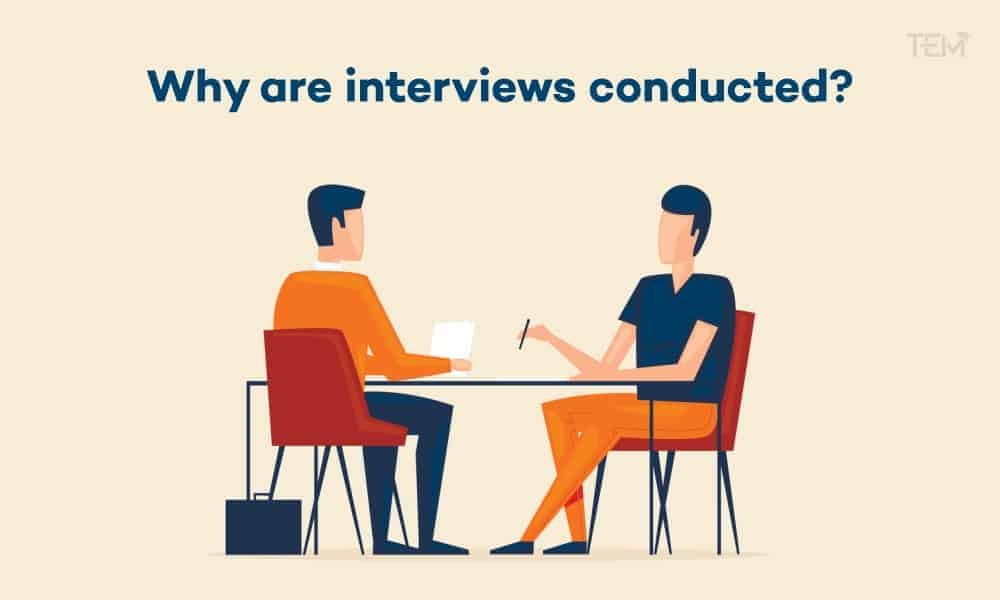An interview is considered to be the most important part of the hiring and selection process. The interview helps to assess the ability and the suitability of the applicant. This is considered a crucial step in the process of recruiting. The process of the interview helps to identify the person and get an idea about his opinions and views.
The interview with the candidate helps the interviewer to understand the capability of the applicant. Along with this, his confidence level and his soft skills are also taken note of. Some other factors that are taken into consideration are the body language and the smartness of the individual.
Why are interviews conducted?

The reason for interviews to be conducted is to evaluate the intelligence and other credentials of the candidate. Interviews are conducted to get an idea of the applicant’s intellect. They are also made obligatory for various legal reasons. With the help of an interview, the interviewer can reach a personal level with a candidate and get to know about his expectations from a particular job.
The interviewers can also explain their job requirements at a transparent level and clarify all the necessary details and benefits beforehand. Sometimes, the interviewers also conduct a small verbal test to know the presence of the mind of the candidate.
Let us take a glimpse through the various types of interview:
- The Traditional Interview: A traditional interview is still very common and the length is usually from a half-hour to one and a half hours. The applicant is generally asked questions about the Common Interview Questions section and some of the behavioural questions related to the job. After the completion of this interview, the applicant might be called in for 2-3 more interviews.
- The Panel Interview: In a panel interview, the applicant is questioned by several people generally 3-5 or it can max up to ten people. Sometimes, each person might ask the candidate certain questions and sometimes, only a few might ask and the rest will listen. The benefit of appearing for a panel interview is that several members can meet the candidate. Also, the interviewers can keep the number of candidates to one or two. The questions asked could be behavioral, traditional, or a combination of both.
- The Behavioural Interview: During this type of interview, the interviewer will be provided with information about how the applicant thinks and behaves in various situations. The hiring managers show a keen interest in the way the person deals or manages a certain situation. This gives them an idea about the way the person will respond and tackle a difficult situation. In order to bag the job position, the STAR method is an effective way to answer behavioral questions. In this method, the person will have to provide the manager with four-piece information based on—Situation, Task, Action, Results.
- The Serial Interview: Among the various types of interview, the serial interview will consist of a series of interviews on the same day. For example, if the interviewee is given a slot of 2-3:30 then the person will have 5 half-hour interviews. It is most likely that all the interviewers will ask different types of questions and the questions will vary. If the interview is scheduled between lunchtime, it will be possible that someone might take the applicant to lunch. But, this will be considered to be a part of the interview.
- The Case Interview: The case interview is generally made of all sorts of case questions that the applicant has to answer. Also, generally, the entire interview might consist of a case-based question or sometimes only 2-3 questions are asked. The applicant might be given a problem or a scenario related to the particular industry and he would be asked to describe the solution to it. During this, the interviewer might not necessarily look for the right answer but will want to know the applicant’s problem-solving skills. This type of interview is generally conducted by consulting firms, investment banks, technical positions, and upper-level management positions. The candidate might also be required to provide detailed financial analysis, to plan an event, or to develop a marketing campaign.
- The Phone/Skype Interview: Many interviewers will schedule phone interviews as an initial screening of potential candidates to save the company time and money. The phone/Skype type of interview might be conducted by a human resources representative or a hiring manager.
- The Lunch Interview: The job interviewers can take some of the candidates for lunch. The main motive behind the lunch interview is to assess the aspirant for his business etiquette, communication, and interpersonal skills, social skills, and table manners.
- The Stress Interview: These types of interview are conducted to test and understand how the candidate will react to unexpected situations and pressures. That implies that the interviewer can be rude, sarcastic, and argumentative with the aspirant. The interviewer might even leave long pauses between the questions to unnerve the candidate and evaluate how he acts under this type of pressure. The ideal way to deal with this type of interview is by being calm.
- The Working Interview: In some industries—engineering, designing, writing styles, sales— it is very common to ask the applicant to perform a task or a sample of work as the first step of the interview. So, the people conducting the interview don’t want to know about the applicant’s work but want to see it instead. Normally, there is a personal interview conducted after this step to talk to the person appearing for the job.
- The Group Interview: Group interviews aren’t common in the industries but are conducted for sales roles, internships, or other positions in which the establishment is hiring numerous people for the same job.
- The Career Fair Interview: This interview is a swift one and the applicant has only 5-10 minutes to finish off the interview. It is an impromptu interview wherein the applicant will have to impress the recruiter for a full-time interview.
- The Competency Interview: These interviews are structured to be based on the competency of the applicant for the job. This will generally be mentioned in the job specifications so the applicant must read it thoroughly and be well-prepared for it. The person should also keep answers ready for such type of questions which might comprise of questions like ‘Give me an example of a time you worked as a team to achieve a common goal’ or ‘Describe a situation where you were asked to do something that you’d never attempted previously.’
- The Portfolio Interview: The portfolio based interviews are generally conducted in the design/digital communications industry. The recruiters might ask the applicant to show the portfolio. The candidate should be certain that his work is up to the mark and updated.
- The Exit Interview: When an employee has decided to resign and leave, or when he is being terminated from the company, the exit interviews are supposed to be conducted. These interviews are conducted in order to know about the environmental conditions in the office and get some feedback on the office.
Watch Here:- Job Interview Question & Answers for freshers
There are certain tricks to get an idea if the job interview went well or not. We’ve gathered some of the very typical signs that might hint you if you’ve been selected. Let us glance through them:
- You’re Asked About Your Interest in the Job
- Getting Specific About the Job Responsibilities
- Your Interviewer Gives Positive Affirmation
- You Get an Invitation for a Second Interview
- The Interview Runs Longer Than 30 Minutes
- The Interviewer Responds to Your Follow-up
- Salary Comes Up
- types of essays
Also Read,


